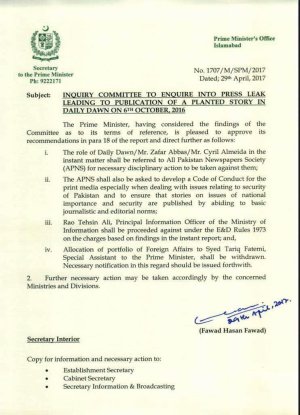So, Dharna/protest is out of the system when PTI is itself part of the system? Do protests for accountability and transparency harm the capacity of the system to improve itself?. As i said earlier acceptance and legitimization of corruption is a different thing than prevalence of it.
By all means protest but you and I both know it's not the simple act of protesting that bothers me, don't we? PTI has a constitutional right to protest and I actually support their stance that NS should present himself for accountability. IK's dharnas, however, are more than just protests against corruption. My biggest gripe there is the involvement of the one party I absolutely don't want anywhere near our politics, the khakis. While the behind the scenes workings of our political machinery are mired in secrecy, there was enough evidence during the last dharna to suggest army involvement and I absolutely do oppose the khakis interfering with politics no matter how noble their cause. Earlier some people were objecting to me calling PTI an establishment party and this is what I was referring to. The PTV siege(reports of ISI operatives guiding dharna participants through PTV's labyrinthine building that I still can't navigate despite being there a dozen or so times), IK leaving midway through the dharna to meet Raheel Sharif, Tahir ul Qadri calling for the army to take the government down and a PTI insider who I actually have a great deal of respect for leaving the party over concerns, public ones at that, that the army was involved. Besides, the plan IK has presented for the protest is thoroughly undemocratic. The first phase apparently involves shutting down major roads in Islamabad and while I'm all for his right to protest, what I'm not for is him shutting my city down and bringing life to a grinding halt. Protest in front of parliament if he wants but a shutdown is unacceptable. What's even more unacceptable is khaki involvement.
The so called self correction system still needs an agency. I think demand of PM's accountability in no way works counter to this objective.
And what agency is that, pray tell? I was under the impression that the agency in question is usually the public but clearly you have different ideas. What was the agency for change, for instance, in Brazil or Korea? Did anyone shut down Brasilia or Seoul?
31 years is reasonable time period IMO. But the problem here is that you have to move inch by inch to reach there in 20 -30 years but in these 8 years we have not moved an inch. In fact, PPP's reign was more democratic in essence as they gave importance to parliament.
That, right there, is the problem. You, much like the rest of our public, want quick results but want to skip the process that leads to them. Eight years is no time to make a judgement of this sort. Given the disparity between Pakistan and Brazil's economic fortunes, even after 31 years our democracy will not be as robust as their's is now.
Kindly also share your opinion about relative quick turnarounds in South Korea, Malaysia.
Korea is not a good example here because they adopted democracy once they were already a borderline developed country. I keep repeating myself over and over about economic development and policy and Korea is a shining example of the central role the economy plays in determining the quality of your institutions and levels of corruption. Korea's democracy got off to a quick start because in a relatively wealthy country, the people are more empowered to begin with and have greater recourse to means of holding their representatives to account. Malaysia is a country I haven't studied in as much detail as Korea or Brazil but their ongoing 1MDB scandal is very Pakistani in nature in that a sitting PM brazenly steals a cool billion dollars from a state institution and upon being asked to present himself for accountability, starts cracking down on opposition while getting in bed with Islamist parties and the Saudi government to bolster his domestic position so Malaysia isn't the best example to use here.
Chinese,Russians are not a group of illiterate billion and half.They have education and finances. Don't you think that if a considerable proportion of their population decides to change the system they would be quite visible?
They wouldn't because, as I said, both states are notorious for controlling the flow of information to and from the outside world, strict control on both the domestic media and even the internet in China's case, and the use of brutal policies to suppress dissent which forces a lot of it underground. It's anyone's guess just how big a chunk of their population isn't satisfied with what's been going on but signs of dissent in Russia have been obvious for the last half decade or so and China will see a rise in such activities too now that the government will have a harder time upholding their covenant with the people of the government ensuring the economy thrives and the people, in return, hand over some of their basic human rights.
Last but not the least, share your reasons that put PTI in far right segment?
Their policy vis-a-vis religious parties, terrorist organizations and religion's role in the education system put them in the same league as JI in my book and JI is the poster child for the Pakistani far right.








